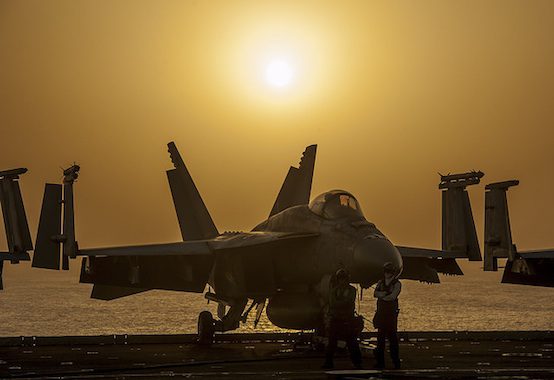The Five Stages of Interventionism

Trevor Thrall describes the five stages of U.S. military intervention:
The United States and its European allies are ramping up plans to intervene in Libya again, this time to confront the growing Islamic State presence in the country. The eagerness to jump back into Libya follows a five-stage pattern that has become all too familiar since the end of the Cold War. This pattern reflects the fundamental inability of the American political system to accept the world as it actually is, rather than how policymakers prefer it to be. Without addressing this dysfunction, the United States will find itself unable to break its cycle of failure in the Middle East.
We saw the first part of this pattern on display in the summer of 2014 just before the U.S. started bombing ISIS positions in Iraq and in Syria soon after that. At the time, the new intervention in Iraq was sold as a “limited” emergency measure aimed at protecting persecuted Yazidis, and there was not much of an effort to pretend that this had anything to do with U.S. or even allied security. To say that there was even a stunted debate about the war on ISIS would be generous. In this case, the debate was skipped and the U.S. launched its campaign without further ado. That campaign continues twenty months later without any authorization from Congress.
In most previous debates on the use of force, there was at least some dissent in Congress and some political pressure to vote on the war, but in 2014 there was essentially no dissent and no interest in holding a vote. As one of the few people to argue that the intervention was a mistake, I recall very well that there was almost no public opposition to it. There hasn’t been a premature declaration of victory yet (that’s stage 3), but we have seen how the original mission has expanded into a war in at least three countries and will likely continue to expand to whichever countries happen to have an ISIS affiliate.
The pattern keeps repeating in large part because opposition to each new intervention is almost always sporadic and disorganized while the advocates of “action” are typically working more or less in concert to set the terms of the debate. That gives interventionists additional advantages during the very brief public debates that we do have, and that reinforces the existing bias in favor of “action.” Because the costs of our unnecessary wars remain largely invisible to the public, and because those costs are often borne mainly by the people in other countries, the folly of these wars of choice is easily overlooked or forgotten by most Americans.
Comments